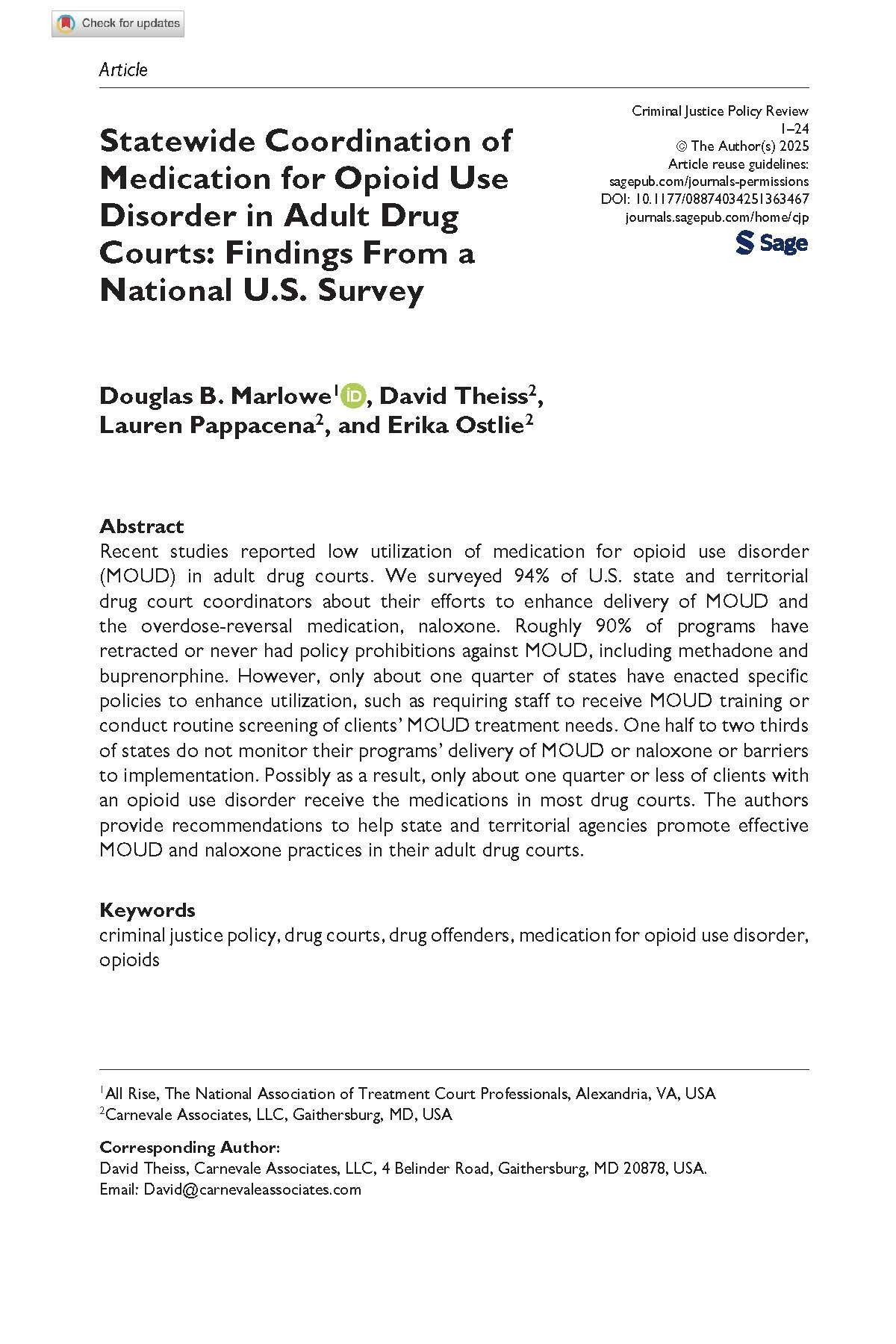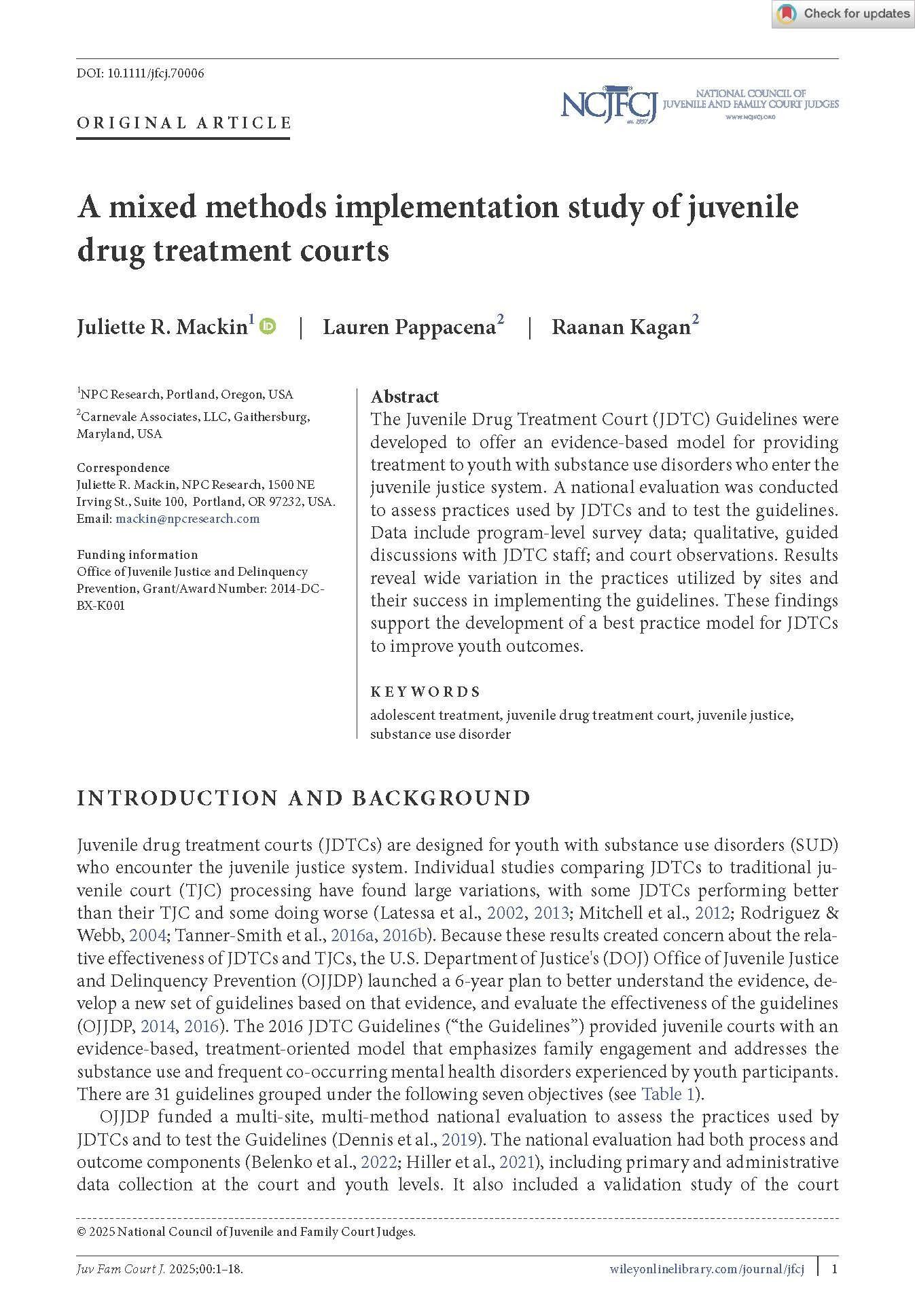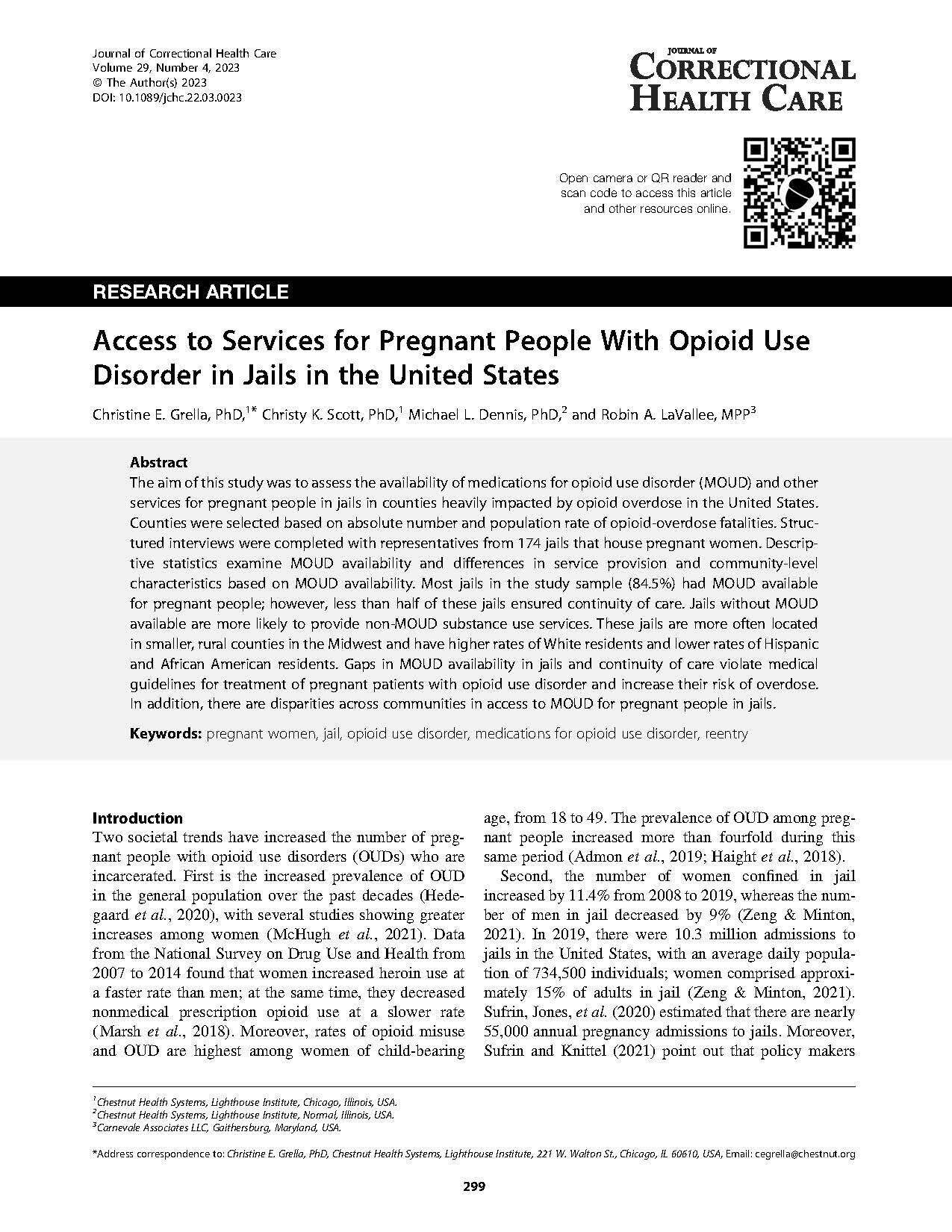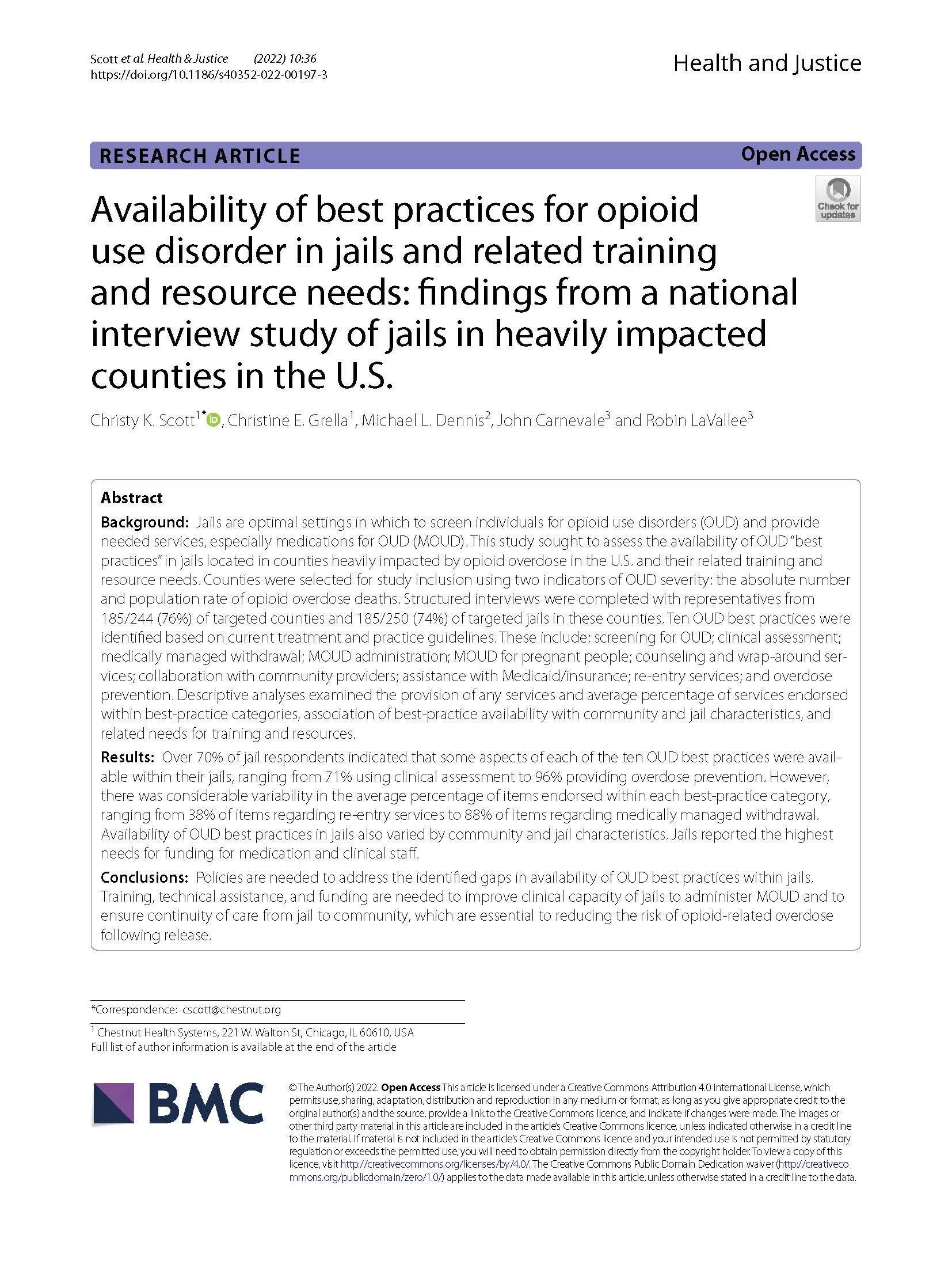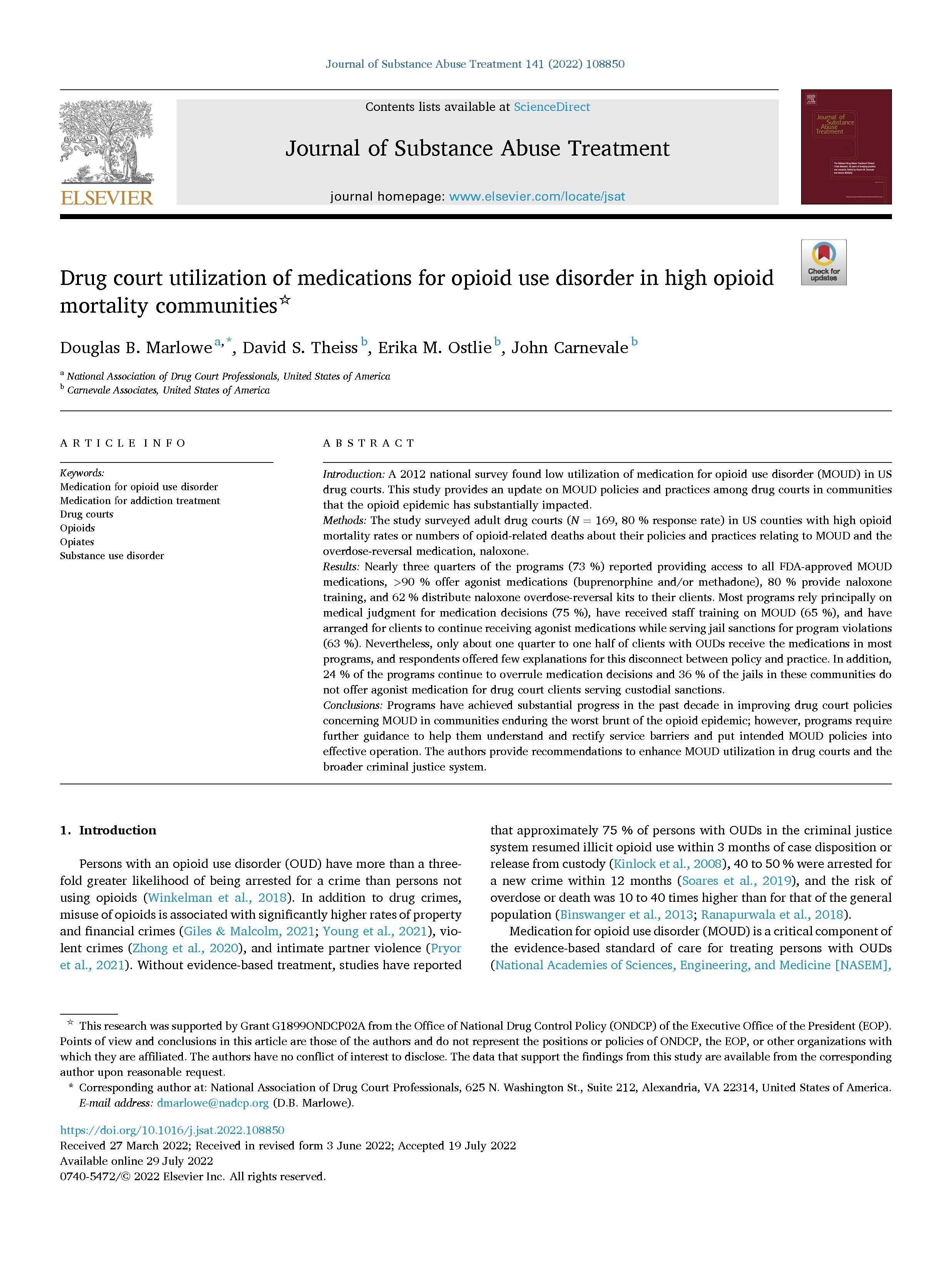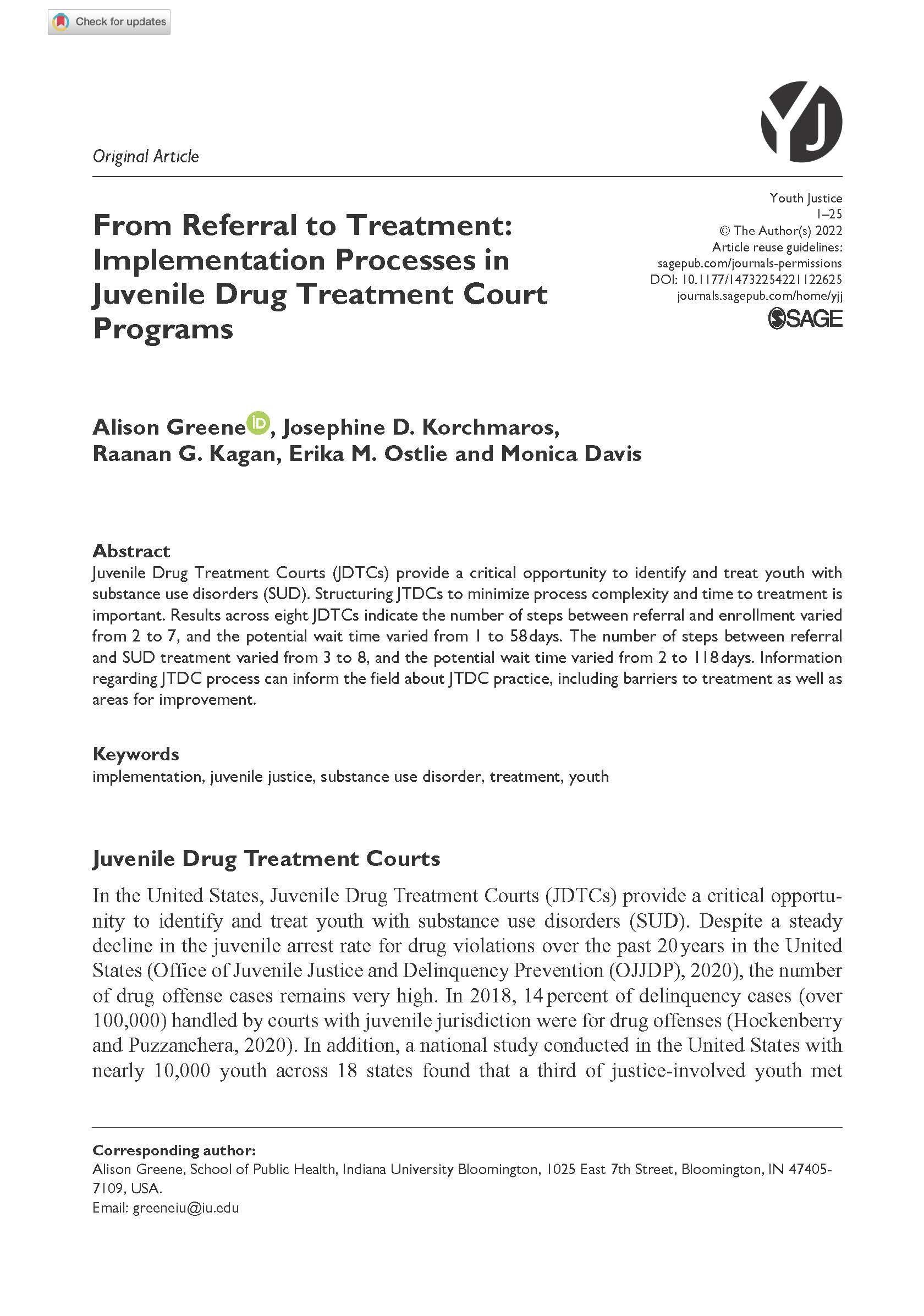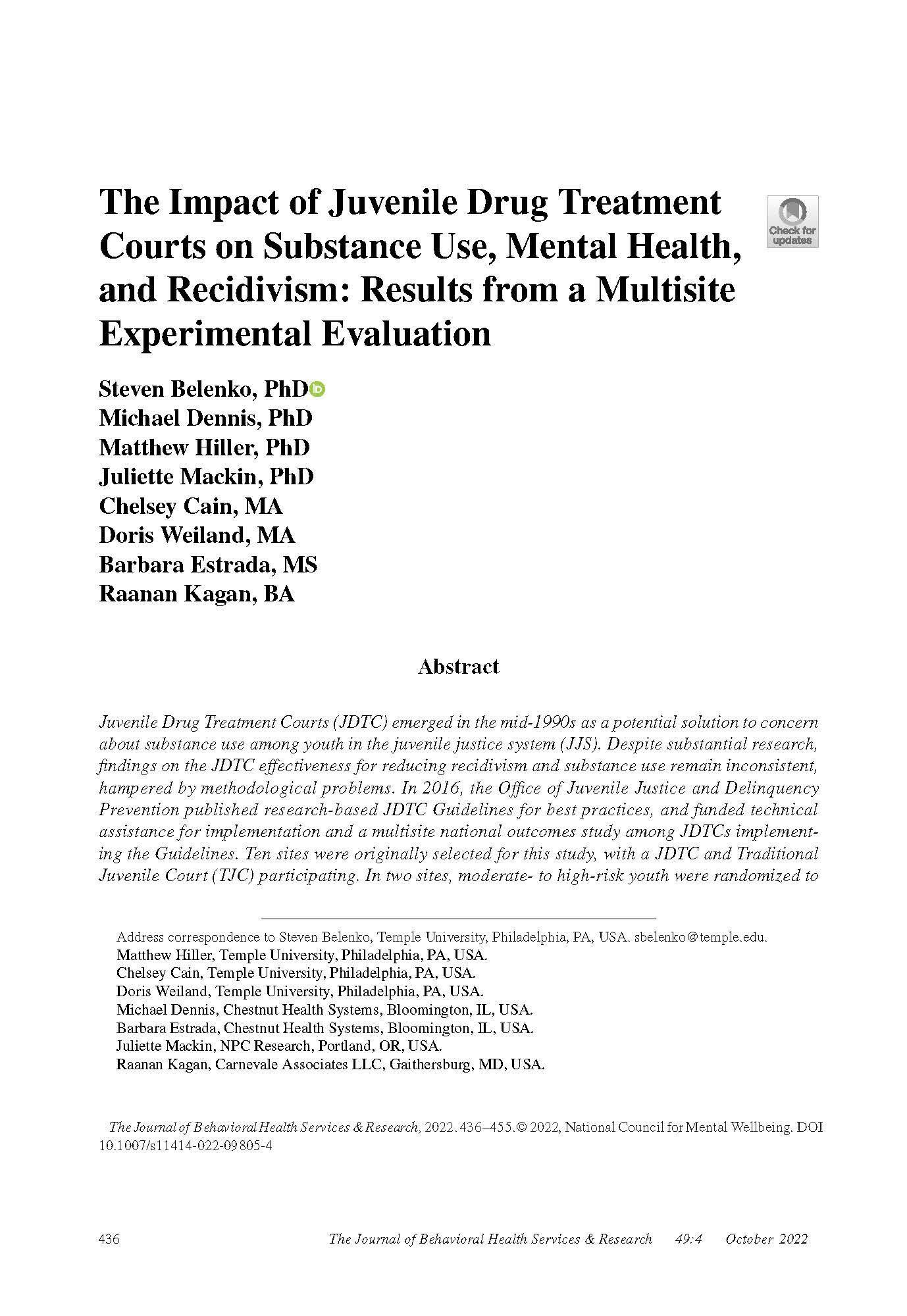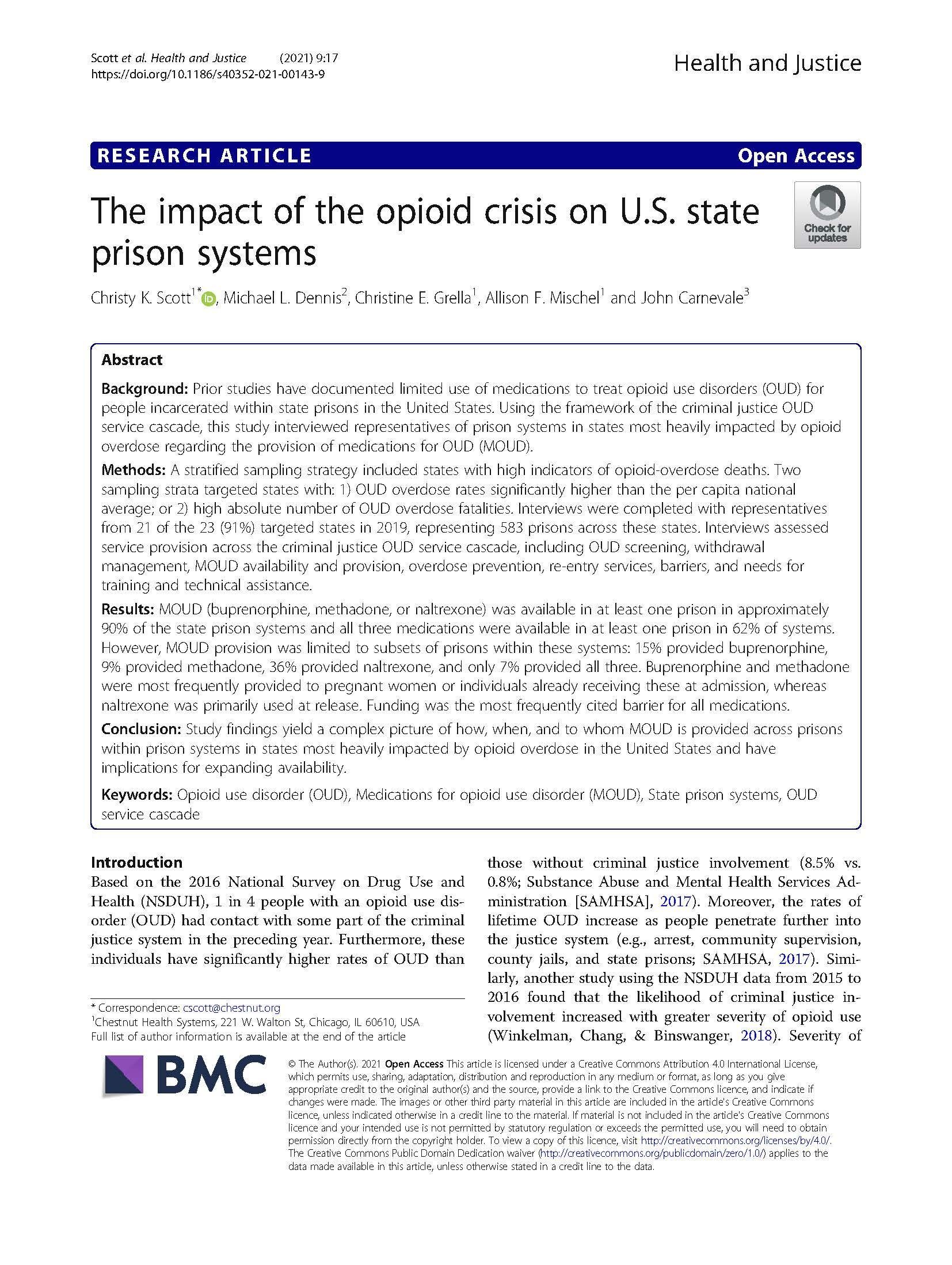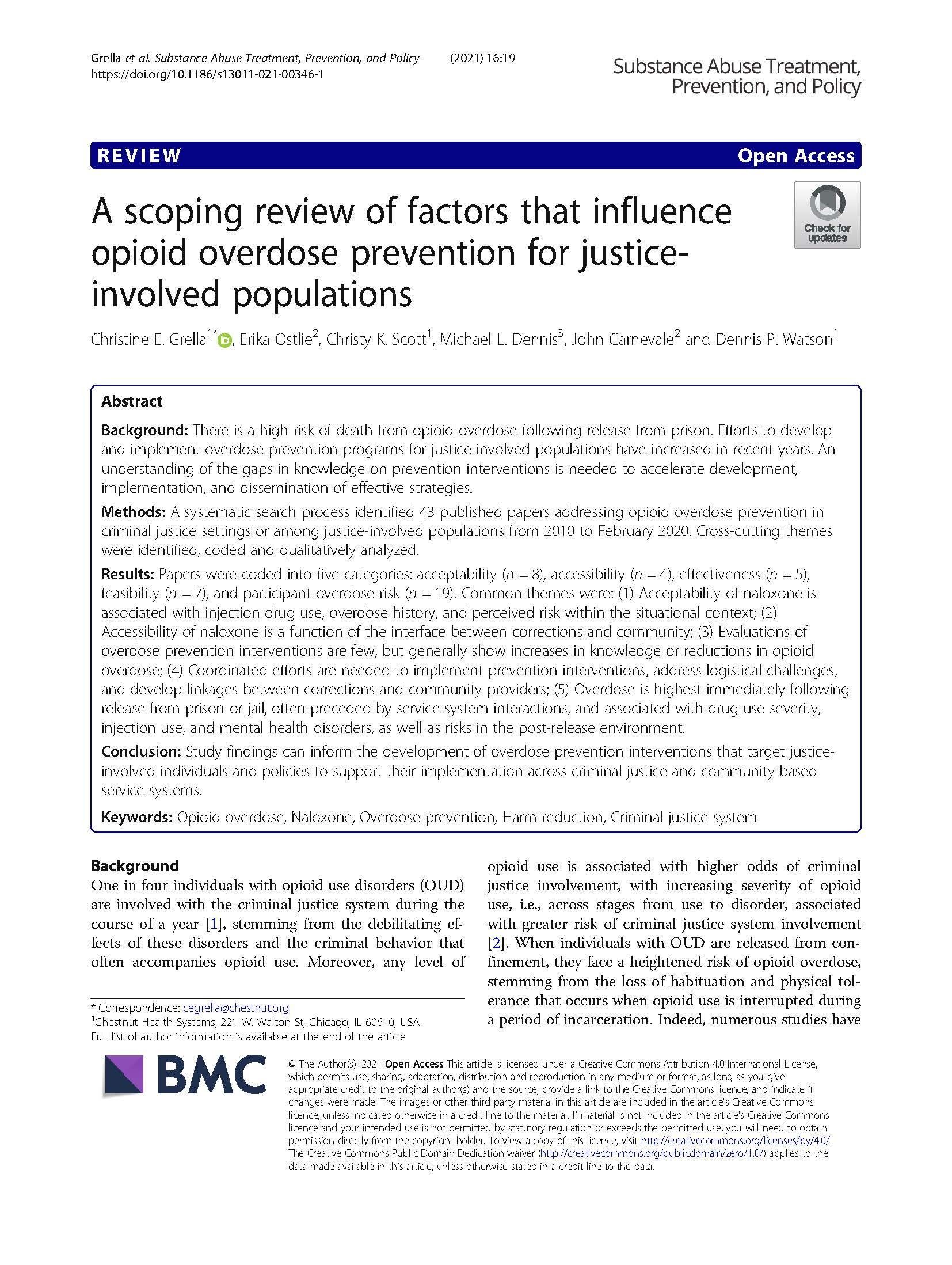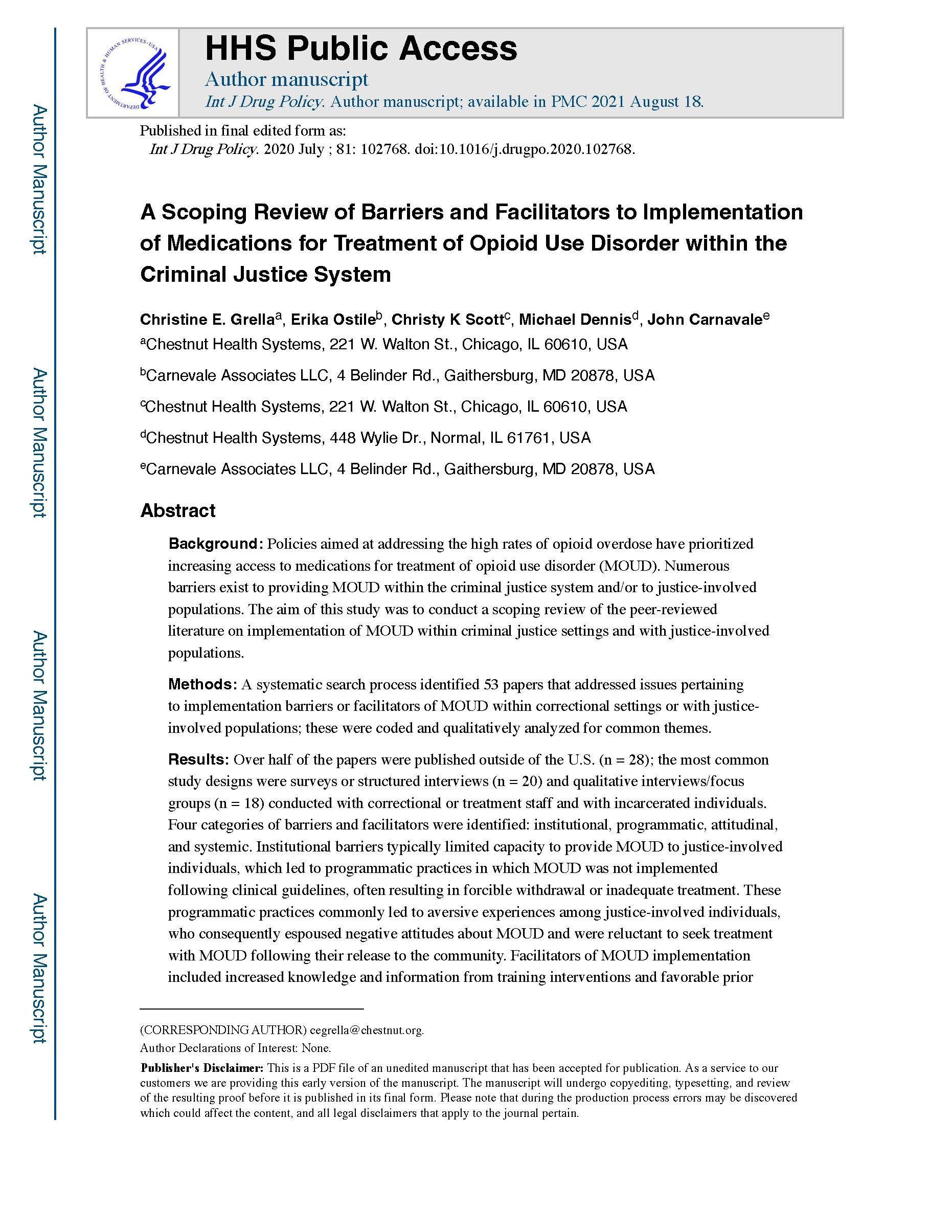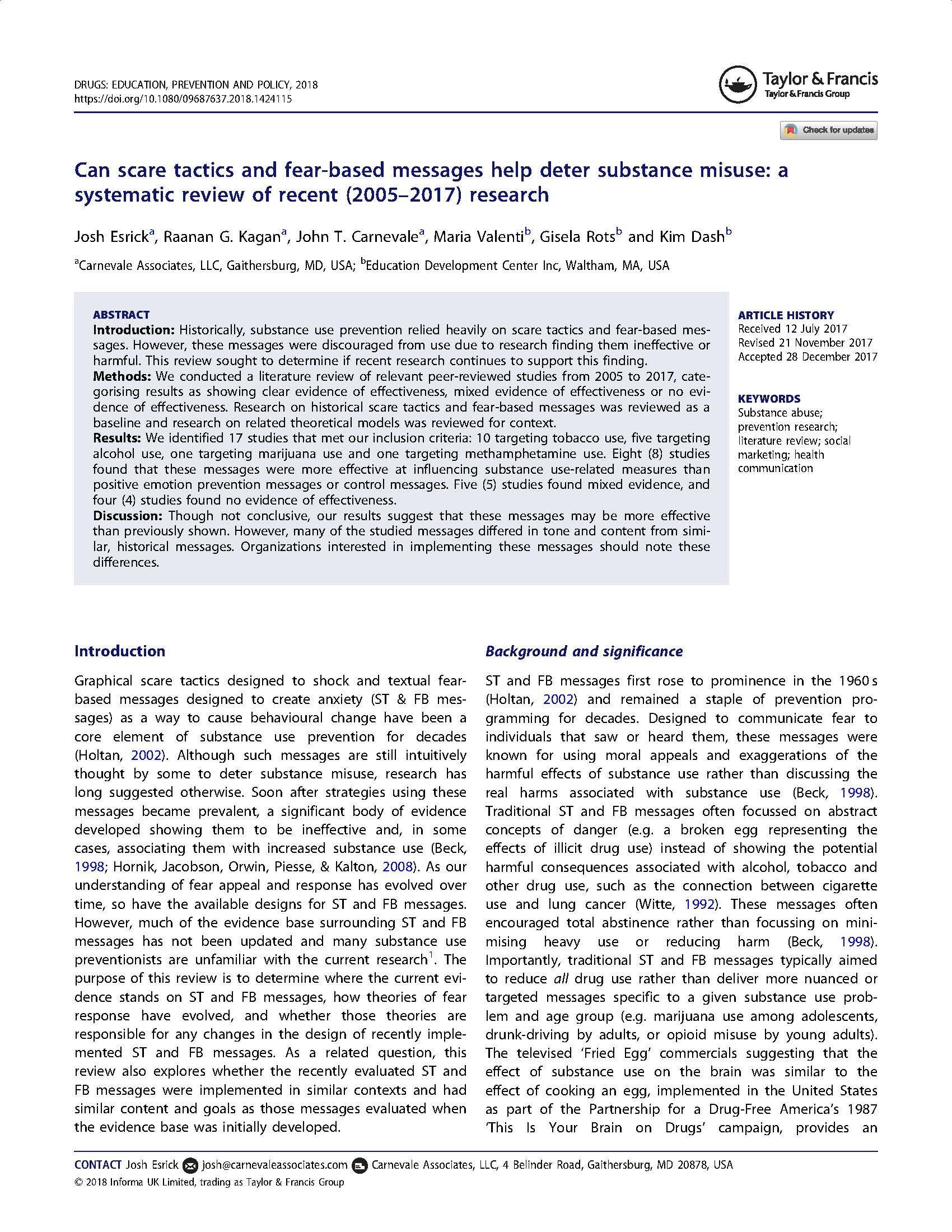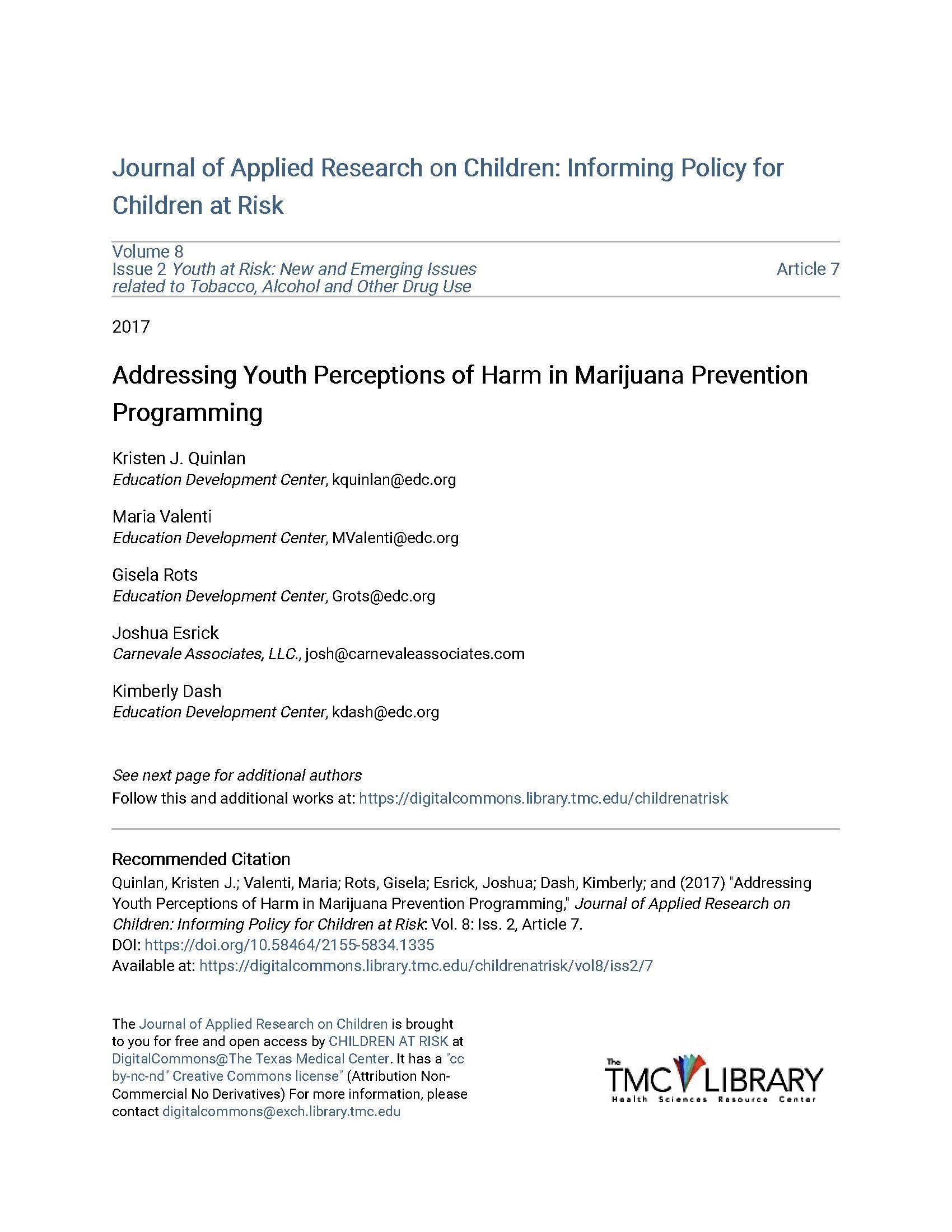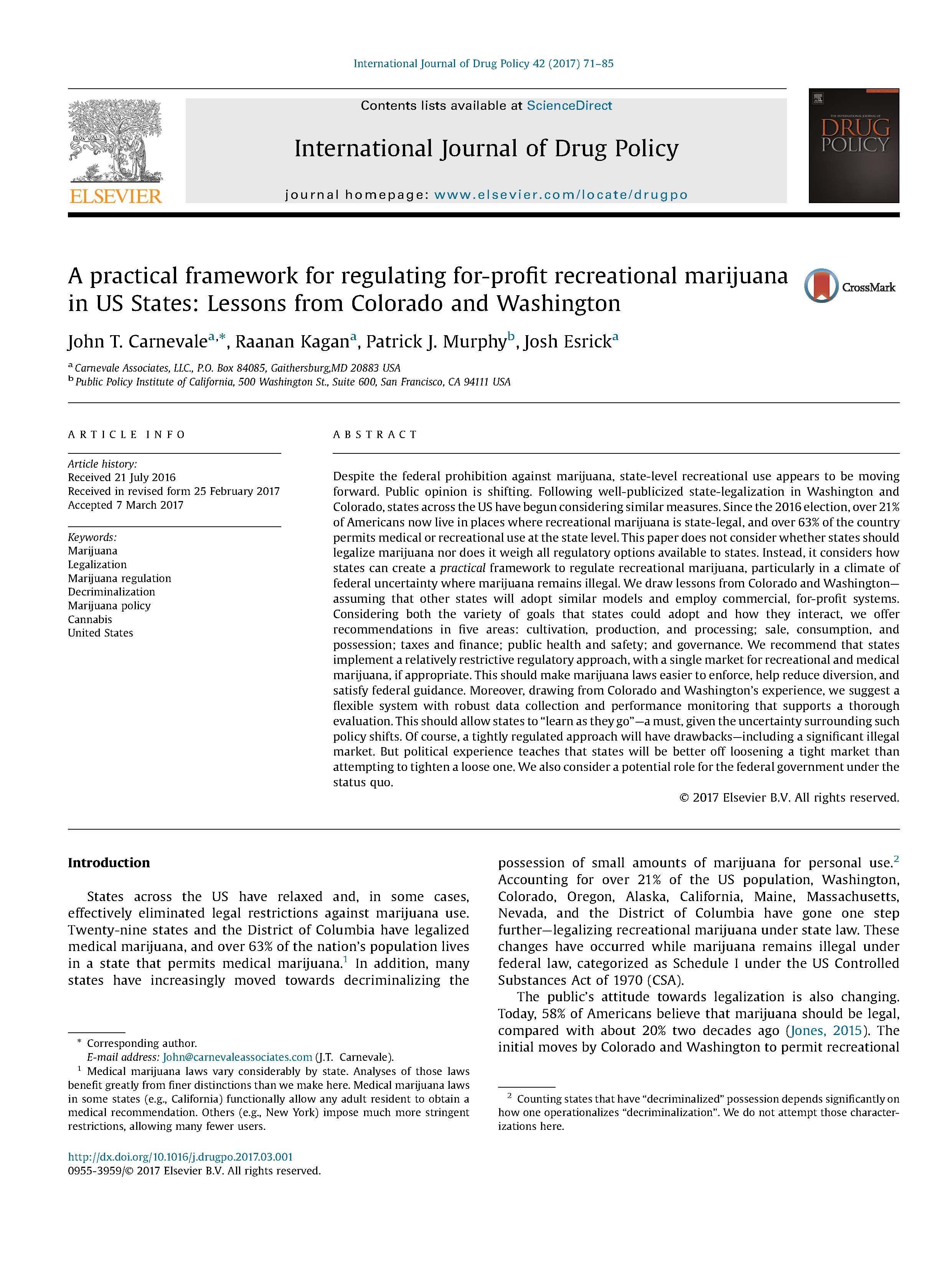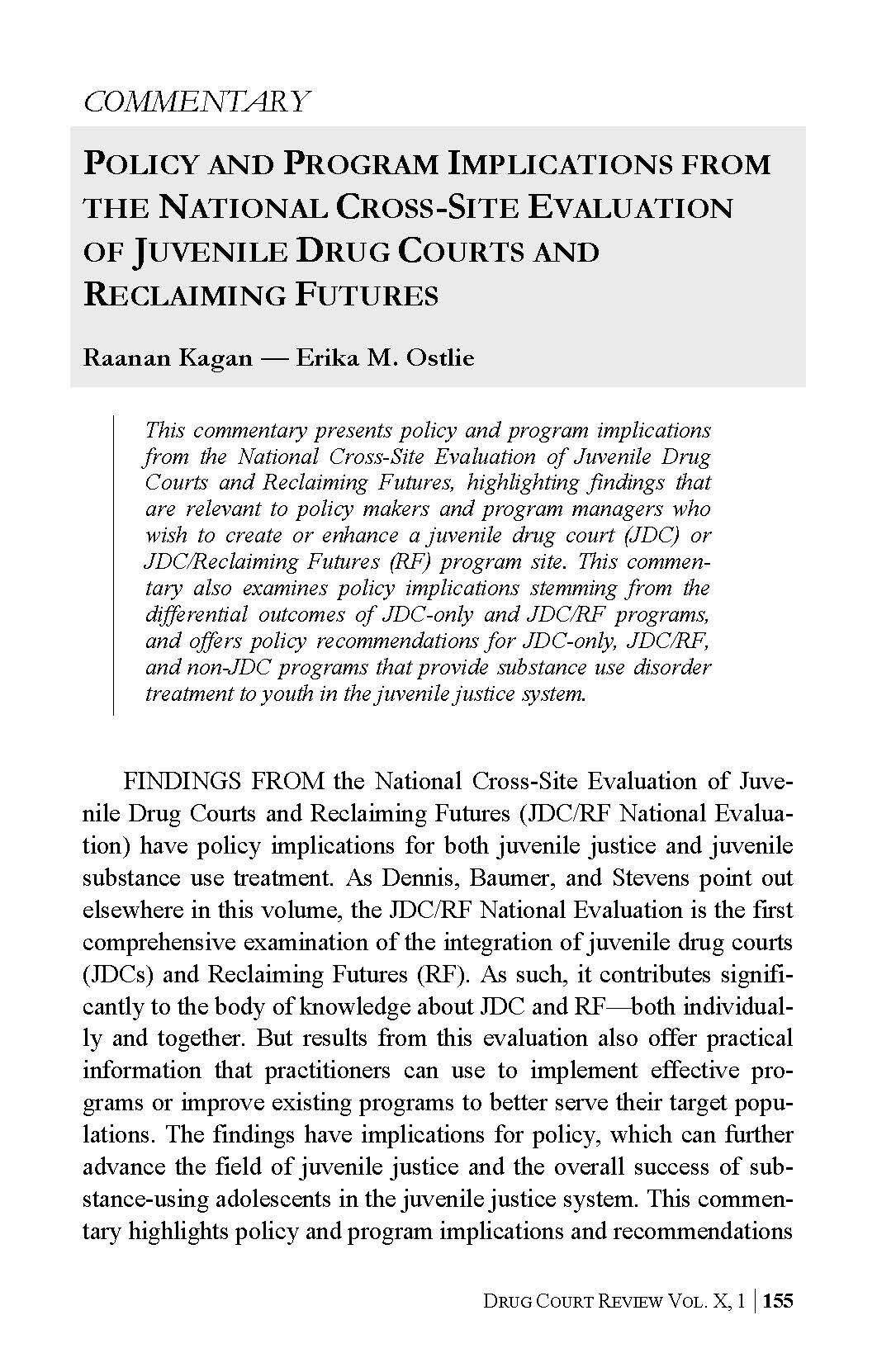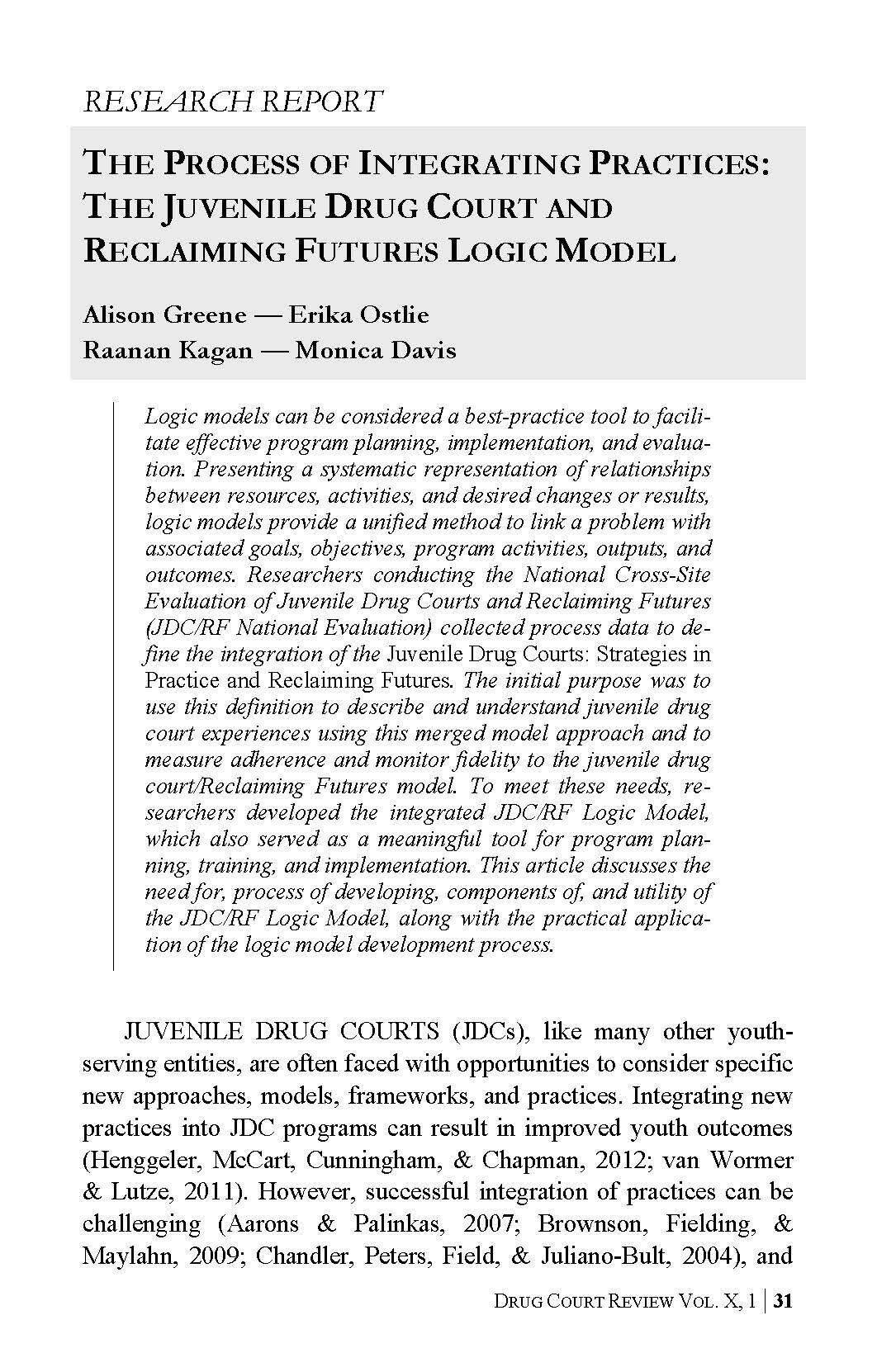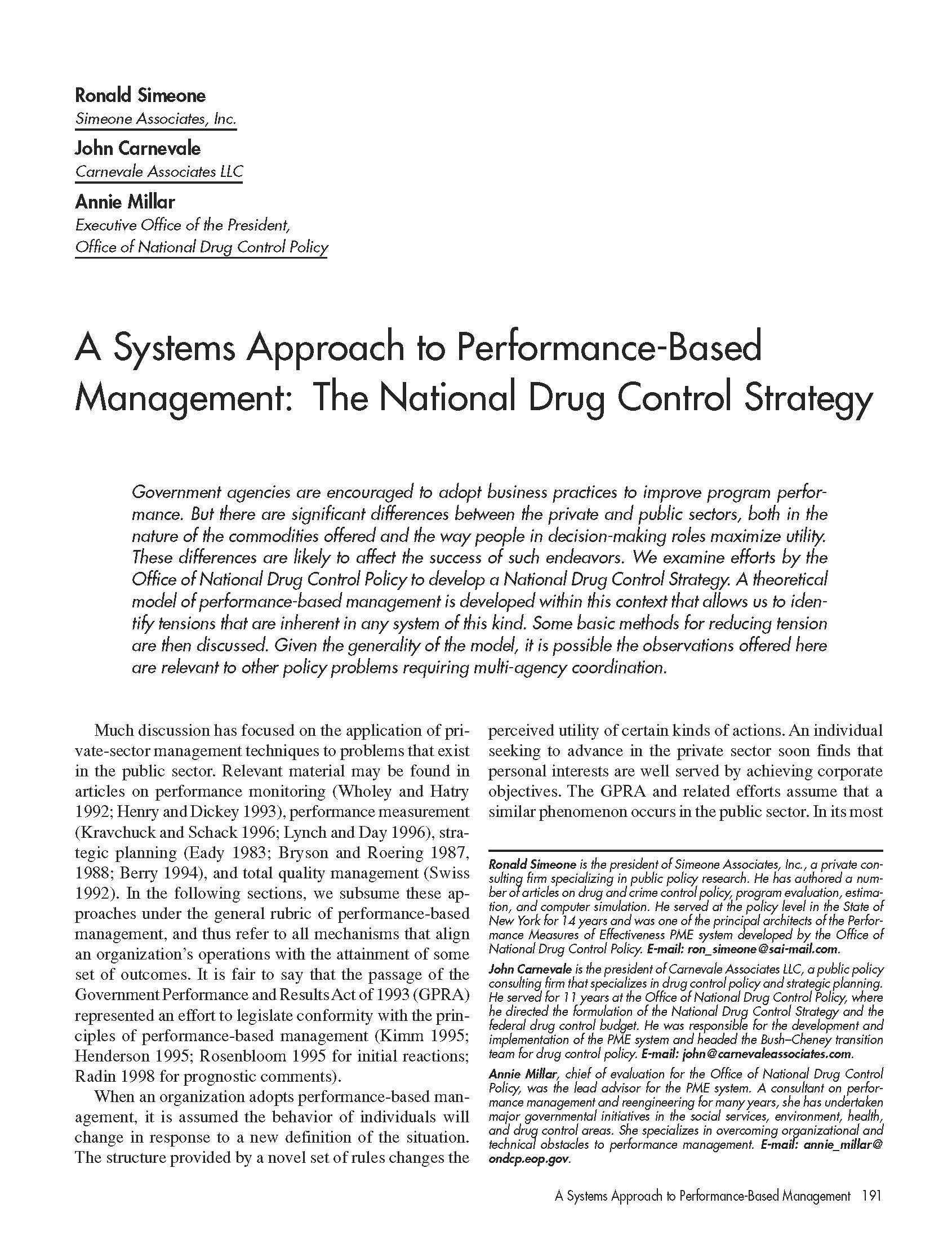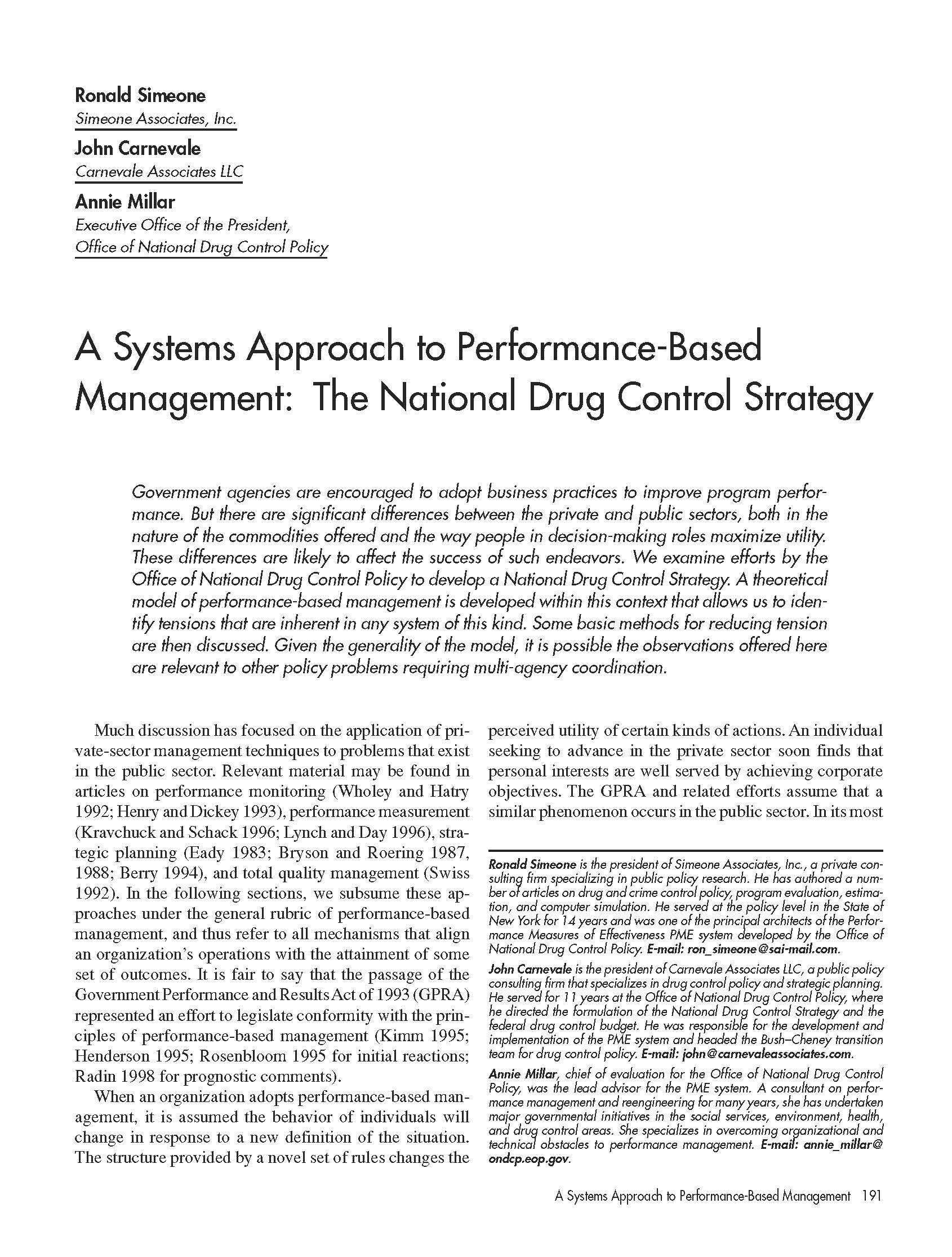Academic Publications
Recent studies reported low utilization of medication for opioid use disorder (MOUD) in adult drug courts. The authors surveyed 94% of U.S. state and territorial drug court coordinators about their efforts to enhance delivery of MOUD and the overdose-reversal medication, naloxone. The authors provide recommendations to help state and territorial agencies promote effective MOUD and naloxone practices in their adult drug courts.
Citation: Marlowe, D., Theiss, D., Pappacena, L., & Ostlie, E. (2025). Statewide coordination of medication for opioid use disorder in adult drug courts: Findings from a national U.S. survey. Criminal Justice Policy Review. Advance online publication. https://doi.org/10.1177/08874034251363467
The Juvenile Drug Treatment Court (JDTC) Guidelines were developed to offer an evidence-based model for providing treatment to youth with substance use disorders who enter the juvenile justice system. A national evaluation was conducted to assess practices used by JDTCs and to test the guidelines. Data include program-level survey data; qualitative, guided discussions with JDTC staff; and court observations. Results reveal wide variation in the practices utilized by sites and their success in implementing the guidelines. These findings support the development of a best practice model for JDTCs to improve youth outcomes.
This paper was developed jointly with Dr. Juliette Mackin of NPC Research. The National Cross-Site Evaluation of JDTC Guidelines project was supported by the Office of Juvenile Justice and Delinquency Prevention and managed by the National Institute of Justice, Office of Justice Programs, US Department of Justice.
Citation: Mackin, J., Pappacena, L., & Kagan, R. (2025). A mixed methods implementation study of juvenile drug treatment courts. Juvenile & Family Court Journal, 76(2), 47-64. https://doi.org/10.1111/jfcj.70006
Carnevale Associates partnered with researchers at Chestnut Health Systems to publish this paper in the Journal of Correctional Healthcare on a study assessing the availability of MOUD and other services for pregnant women in jails in counties that were heavily impacted by the opioid criss.
Citation: Grella, C., Scott, C., Dennis, M., & LaVallee, R. (2023). Access to services for pregnant people with opioid use disorder in jails in the United States. Journal of Correctional Health Care, 29(4), 299-307. https://doi.org/10.1089/jchc.22.03.0023
Carnevale Associates partnered with researchers at Chestnut Health Systems to publish this paper in Health & Justice exploring best practices and training needs to meet the needs of people with OUD in US jails.
Citation: Scott, C., Grella, C., Dennis, M., Carnevale, J., & LaVallee, R. (2022). Availability of best practices for opioid use disorder in jails and related training and resource needs: Findings from a national interview study of jails in heavily impacted counties in the U.S. Health & Justice, 10(36). https://doi.org/10.1186/s40352-022-00197-3
The National Association of Drug Court Professionals and Carnevale Associates teamed up to publish this paper providing an update on MOUD policies and practices among adult drug courts in communities that are substantially impacted by the opioid epidemic.
Citation: Marlowe, D., Theiss, D., Ostlie, E., & Carnevale, J. (2022). Drug court utilization of medications for opioid use disorder in high opioid mortality communities. Journal of Substance Abuse Treatment, 141, Article 108850. https://doi.org/10.1016/j.jsat.2022.108850
Carnevale Associates worked with researchers at the University of Arizona on this paper examining implementation process in JDTCs.
Citation: Greene, A., Korchmaros, J., Kagan, R., Ostlie, E., & Davis, M. (2022). From referral to treatment: Implementation processes in juvenile drug treatment court programs. Youth Justice, 23(3), 286-310. https://doi.org/10.1177/14732254221122625
Carnevale Associates worked with researchers at Temple University, Chestnut Health Systems, and NPC Research on this paper in the Journal of Behavioral Health Services & Research. Findings from four sites with sufficient cases and follow-up rates indicated that JDTCs reduced cannabis use, increased access to mental health services, and reduced recidivism. However, the effects were small to moderate, with positive impacts mainly observed among high-risk youth. The impacts of JDTCs may have been attenuated because Guidelines implementation was inconsistent across courts, and some TJCs implemented elements of the Guidelines, blurring the distinction between JDTCs and TJCs.
Citation: Belenko, S., Dennis, M., Hiller, M., Mackin, J., Cain, C., Weiland, D., Estrada, B., & Kagan, R. (2022). The impact of juvenile drug treatment courts on substance use, mental health, and recidivism: Results from a multisite experimental evaluation. The Journal of Behavioral Health Services & Research, 49, 436-455. https://doi.org/10.1007/s11414-022-09805-4
Carnevale Associates partnered with researchers at Chestnut Health Systems to publish this paper in Health & Justice exploring the impacts of the opioid epidemic in state prisons, specifically regarding the provision of medications for opioid use disorder (MOUD). Study findings yield a complex picture of how, when, and to whom MOUD is provided within prison systems in states most heavily impacted by opioid overdose in the United States and have implications for expanding availability.
Citation: Scott, C., Dennis, M., Grella, C., Mischel, A., & Carnevale, J. (2021). The impact of the opioid crisis on U.S. state prison systems. Health & Justice, 9(17). https://doi.org/10.1186/s40352-021-00143-9
Carnevale Associates partnered with researchers at Chestnut Health Systems to publish this scoping review in Substance Abuse Treatment, Prevention, and Policy of factors that influence overdose prevention for justice-involved populations. Findings can inform the development of overdose prevention interventions that target justice-involved individuals and policies to support their implementation across criminal justice and community-based service systems.
Citation: Grella, C., Ostlie, E., Scott, C., Dennis, M., Carnevale, J., & Watson, D. (2021). A scoping review of factors that influence opioid overdose prevention for justice-involved populations. Substance Abuse Treatment, Prevention, and Policy, 16, Article 19. https://doi.org/10.1186/s13011-021-00346-1
Carnevale Associates partnered with researchers at Chestnut Health Systems to publish this scoping review in the International Journal of Drug Policy finding that barriers to implementing medication for opioid use disorder (MOUD) in criminal justice settings and with justice-involved populations are pervasive, multi-leveled, and inter-dependent.
Citation: Grella, C., Ostlie, E., Scott, C., Dennis, M., & Carnevale, J. (2020). A scoping review of barriers and facilitators to implementation of medications for treatment of opioid use disorder within the criminal justice system. International Journal of Drug Policy, 81, Article 102768. https://doi.org/10.1016/j.drugpo.2020.102768
This paper, developed jointly with the Education Development Center (EDC), presents the results of systematic review of scare tactics and fear-based messages as substance use prevention tools.
Citation: Esrick, J., Kagan, R., Carnevale, J., Valenti, M., Rots, G., & Dash, K. (2018). Can scare tactics and fear-based messages help deter substance misuse: A systematic review of recent (2005-2017) research. Drugs: Education, Prevention and Policy, 26(3), 209-218. https://doi.org/10.1080/09687637.2018.1424115
Carnevale Associates partnered with researchers at the Education Development Center (EDC) to publish this paper in the Journal of Applied Research on Children on addressing youth perceptions of in marijuana prevention programs
Citation: Quinlan, K., Valenti, M., Rots, G., Esrick, J., & Dash, K. (2017). Addressing youth perceptions of harm in marijuana prevention programming. Journal of Applied Research on Children: Informing Policy for Children at Risk, 8(2), Article 7. https://doi.org/10.58464/2155-5834.1335
Produced in collaboration with researchers at the Public Policy Institute of California and published in the Journal of International Drug Policy, this paper examines lessons-learned from Washington and Colorado's for-profit marijuana markets. The paper does not consider whether states should legalize marijuana nor does it weigh all regulatory options available to states. Instead, it considers how states can create a practical framework to regulate recreational marijuana, particularly in a climate of federal uncertainty where marijuana remains illegal. We draw lessons from Colorado and Washington-assuming that other states will adopt similar models and employ commercial, for-profit systems.
Citaiton: Carnevale, J., Kagan, R., Murphy, P., & Esrick, J. (2017). A practical framework for regulating for-profit recreational marijuana in US states: Lessons from Colorado and Washington. International Journal of Drug Policy, 42, 71-85. https://doi.org/10.1016/j.drugpo.2017.03.001
Developed in conjunction with researchers at the University of Arizona and published in Drug Court Review, this commentary paper presents policy and program implications from the national cross-site evaluation of juvenile drug court/Reclaiming Futures (JDC/RF).
Citation: Kagan, R., & Ostlie, E. (2016). Policy and program implications from the National Cross-Site Evaluation of Juvenile Drug Courts/Reclaiming Futures. Drug Court Review, X(1), 155-162. National Drug Court Institute.
Developed in conjunction with researchers at the University of Arizona and published in Drug Court Review, this paper presents the integrated juvenile drug court/Reclaiming Futures (JDC/RF) logic model developed for a national cross-site evaluation.
Citation: Greene, A., Ostlie, E., Kagan, R., & Davis, M. (2016). The process of integrating practices: The juvenile drug court and Reclaiming Futures logic model. Drug Court Review, X(1), 31-59. National Drug Court Institute.
Produced in collaboration with researchers at the White House Office of National Drug Control Policy (ONDCP) and Simeone Associates, Inc., this paper examines ONDCP's efforts to develop the National Drug Control Strategy through a multi-agency process.
Citation: Simeone, R., Carnevale, J., & Millar, A. (2005). A systems approach to performance-based management: The National Drug Control Strategy. Public Administration Review, 65(2), 191-202. https://doi.org/10.1111/j.1540-6210.2005.00444.x
Produced in collaboration with researchers at the White House Office of National Drug Control Policy (ONDCP) and Simeone Associates, Inc., this paper examines logic models as performance measurement tools in the context of ONDCP's efforts to develop the National Drug Control Strategy.
Citation: Millar, A., Simeone, R., & Carnevale, J. (2001). Logic models: A systems tool for performance management. Evaluation and Program Planning, 24(1), 73-81. https://doi.org/10.1016/S0149-7189(00)00048-3

